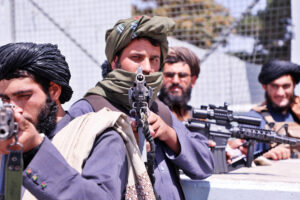A few days ago the capital was full of women going about their business. Now, the few that remain walk fast and full of fear
Four days after the quick and unexpected invasion of Kabul by the Taliban, the streets of the Afghan capital are almost entirely devoid of women.
The few women who are on the streets are wearing the traditional blue burqa, Islamic garb that, while customary in Afghanistan, was not used as widely in Kabul until now. Many women are dressed in the long black clothes commonly worn in the Middle East and Arab nations.
All the women are accompanied by a male guardian – a requirement that the Taliban has imposed on women across the country. Many of these women are out grocery shopping; a simple task that has become extremely dangerous for them.
All the women I see are accompanied by a male guardian – a requirement that the Taliban has imposed on women
It is hard to believe that only a few days ago, Kabul streets were full of women going about their business, despite the encroaching security risk as the Taliban swept across Afghanistan. Now, they walk fast and full of fear, their eyes constantly darting for any potential aggressions from the Taliban fighters who patrol the once vibrant streets.
Since the Taliban’s occupation of Afghanistan, all educational centres, schools, universities, government buildings and private offices have been closed.
At about 10am, I decide to go into Kabul after staying at home for three days. With my parent’s permission, I take a taxi. The driver tells me that since the Taliban took over Kabul, the number of their female customers has decreased. “Most of the women and girls who used our services are those who live alone. Since they don’t have a male guardian, now they can’t even leave the house,” he says.
On the city streets, there are no law or security officials; no police or traffic authorities who once provided a semblance of order. One resident of Kabul says he witnessed the Taliban driving police cars against the traffic in the middle of the road at high speed.
Pol e Sorkh, an area famous as the cultural centre of the young and educated generation of Afghanistan, is no longer lively. Roads and pavements are empty, except for a few sad and depressed-looking men who walk the streets out of boredom.
Laila Haidari, the owner of Taj Begum restaurant, wrote on her social media page: “The world changed for us for ever. Taj Begum is no more.” She, along with many businesswomen, closed her restaurant after the fall of Kabul. Another popular restaurant a few hundred metres away, also run by women, is closed. Those restaurants and cafes in Kabul that remain open have no female employees or customers. All beauty salons across the city are closed, but male barbershops are open.
I still cannot believe the Taliban have control over Kabul. Taliban armed fighters are present every few hundred metres. When I saw a police car on the street, I felt relief for a moment until I saw Taliban fighters inside. They are using police and national army cars that once gave residents a sense of hope.
The Taliban controls all government offices in Kabul, except embassies, and their white flag has replaced the flag of the Afghan republic. I have been trying to interview women who held high positions in Afghanistan’s government, but none have agreed.
Today, 19 August, is the 102nd anniversary of Afghanistan’s independence. Yesterday, hundreds of people tried to raise the tricolor Afghanistan flag in Nangarhar province, but were fired on by the Taliban.
The situation in Kabul is like a wave in the ocean that might change any moment. There is no law, except the restrictive laws of the Taliban that are unbearable for residents. All banks and money exchange shops are closed. People are in a limbo state of fear and stress. Afghans are afraid that there may be another civil war like the 1990s. “I can’t sleep. I’m worried about what could happen even an hour from now. I hope Afghanistan does not experience another civil and ethnic war,” a Kabul resident says.
Source: The Guardian
















